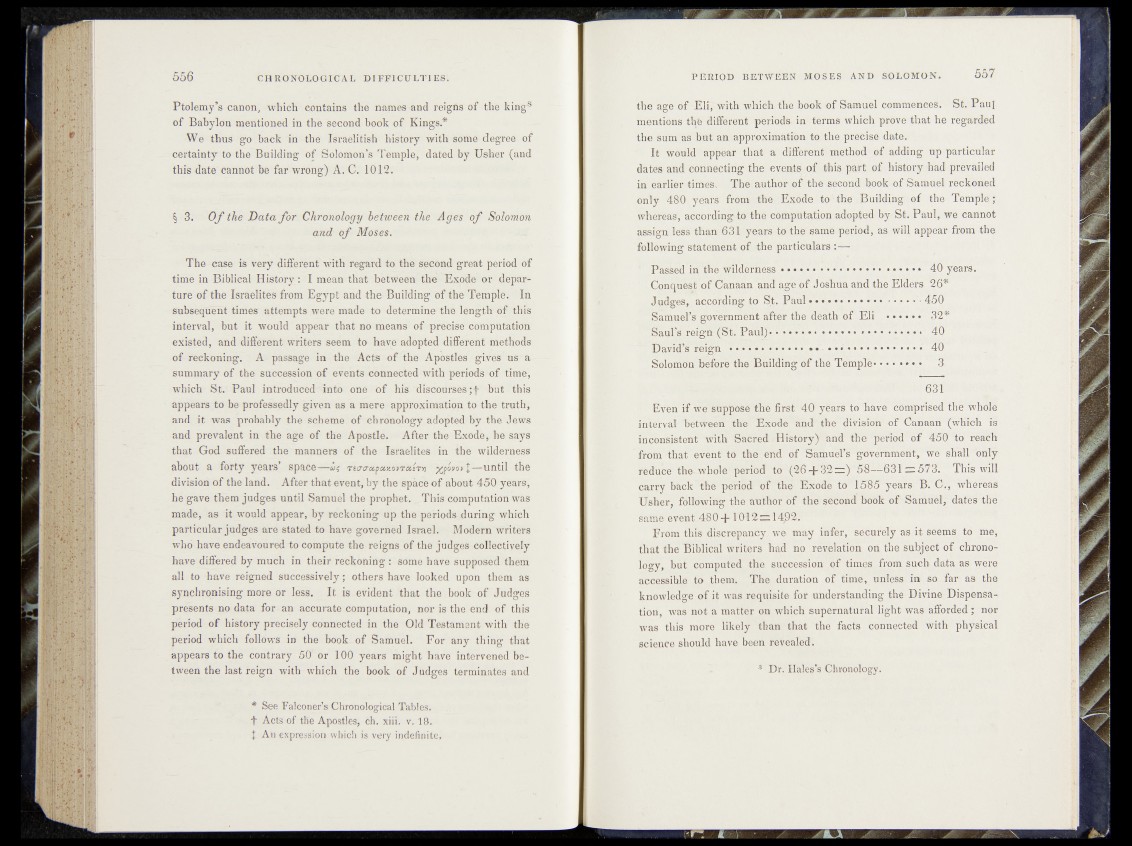
Ptolemy’s canon, which' contains the names and reigfis of the king#
of Babylon mentioned in the second book of Kings;*
We thus go back 'in the Israelitish history -with some degree of
certainty to the Building of Solomon’s Temple, dated by Usher {and
this date cannot be far wrong) A. C. 1012.
§ 3. O f the Data fo r Chronology between the Ages o f Solomon
and o f Moses.
The case is very different' with regard to the second great period- of
time in Biblical History: I mean that between the Exode or departure
of the Israelites from Egypt.and the Building of the Temple. In
subsequent times attempts were made to determine the length Of this
interval, but it would appear that no means of precise eomputation
existed, and different writers seem to have adopted different-methods
of-ieckoning. A-passage in the Acts of the Apostles gives^Us?a
summary of the succession of events connected with periods of time,
which St. Paul introduced into one of his discourses ;f but this
appears to be professedly given as a mere approximation to: the truth,
and it was probably the scheme of chronology adopted by the Jews
and prevalent in the age of the Apostle. After the Exode, he says
that God suffered the manners of the Israelites in the wilderness
about a forty years’ space—ug Tscnrapaxovrarn} until the
division of the land. After that event, by the space of about 450 years,
he gave them judges until Samuel the prophet. This computation was
made, as it would appear, by reckoning up the periodsyduring which
particular judges are stated to have governed Israel. Modern writers
who have endeavoured to compute the reigns Of the judges collectively
have differed by much in their reckoning : some have supposed them
all to have reigned successively; others have looked upon them as
synchronising more or less. It is evident that the book of Judges
presents no data for an accurate computation, nor is the end of this
period of history precisely connected in the Old Testament with the
period which follows in the book of Samuel. For any thing that
appears to the contrary 5(f or 100 years might have intervened between
the last reign with which the book of Judges terminates and
* See Falconer’s Chronological Tables.
f Acts of the Apostles, ch. xiii. v. 1 8 .
% An expression which is very indefinite,
the ag!e-,idf EliTWith whiih^the hook- of Samuel commences, St. Paul
mentions' tbjb ’different'' -pdi^d^ihsterms'' wfiieh^pro^that he regarded
the sum as but an jafijiroxitn.atifm to^thieiprecise date?,vl-
l lp t Whd'Mt’ appear that a diff&ren^hn.htKbd^of adding up‘-particular
dates'and conaectingt’the evenly of* this part^fi': hjstovy- had prevailed
i n earl-ier-tirhes, - ThC?ajithcnf of thVt^l^pdiookvci^^aabH §b reckoned
only wCff^e'aVs from the Exjde^tp^tke ^B'uiidihgfof the Tempfe?
whereas, accordiugfo’ the qonapt^^dniadopi1fediik|^6j^,htfl; we cannot
assign less than|?63.1 yea-fé'to theî,game>p%iddpi|^s;”l^i3| appear-from the
following stateméht of the particulars :—
Y ' Parsed' i ï the wilderness ••• • '•• • ♦ • • • • • • • • ' • « years/ ^
' ‘ Cohmegiiof Canaan and Joshua ana the Elders
J udgcs, according.M' ^ " Paul. . . . . . . -----.* 4);(7 ^
Samuers government^ffer the death p f Eli * * '
rei'gn-^St. Paul^ ^ ^ ^ « • • '••••• . . . . . . . . . . 40
David^i fei&i ^ • •“ 4u,
Sèlbmb’n before the Building of the Temple* •
1 Even if wVtuppose the first 40’ ye'ars to havé ’TOmprised^tnewhdle
interval wltw®n’the Exode and1 the division of ^Canaan i^ylfich is
inconsistent witlT Sacred istbfy)-'and the pettod’ Or W'^rehch
from that'eveht'to the end of Samdel’PgOTemment, we hMll’y6rfPy
reduce the~whole period to- (26 + 32 573.' This will
carry back'the period of the Exode to 1585 years- B f C., wn'efUad
Usher, following tfukuthor of the s'd6bnd*hook of4 Samf||; dates'tha
samfe event ,480 -f-1042rz 14)12.
From this discrepancy, we may infer,: securely as it seems to'1 me,
that the Biblical writers had no revelation on the subject of 'chronology,
but computed the succession of timesf from such data as'; Ware,
accessible to them. The duration of time, unless fe^|p^far as the
knowledge of it was requisite for understanding the Bivinb? Dispensation,
was not a matter on which supernatural fight was afforded; nor
was this more likely than that tfie facts Connected' with physical
science should have been revealed.
Dr! Hales’s Chronology.